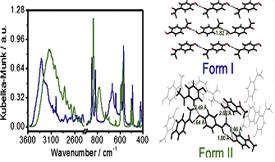
Polymorphism in 4'-hydroxyacetophenone: A Vibrational Analysis
C. E.S. Bernardes, L. M. Ilharco, M. E. Minas da Piedade
Abstract
Simvastatin (SV) is a widely used drug for the treatment of hypercholesterolemia in humans. Nevertheless, serious efforts are still being made to develop new SV formulations with, for example, improved tabletability or bioavailability properties. These efforts frequently involve heating the compound well above ambient temperature or even fusion. In this work, the thermal stability of solid SV under different atmospheres was investigated by using isothermal tests in glass ampules, differential scanning calorimetry, and Calvetdrop microcalorimetry experiments. These tests were combined with analytical data from diffuse reflectance infrared Fourier-transform spectroscopy and liquid chromatography coupled with tandem mass spectrometry or Fourier transform ion cyclotron resonance mass spectrometry (LC–FT–ICR–MS). No decomposition was observed when the sample was kept at a temperature ≤373 K under N2 or reduced pressure (13.3 Pa) atmospheres. Thermal degradation was, however, observed for temperatures ≥353 K in the presence of pure or atmospheric oxygen. The nature of the two main oxidative degradation products was determined through MS/MS experiments and accurate mass measurements of the precursor ions using FT–ICR–MS. The obtained results indicated that the decomposition process involves the oxidation of the hexahydronaphthalene fragment of SV.
Return Previous Next